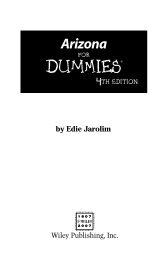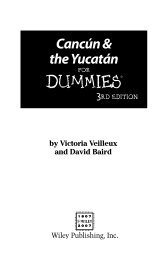- Page 1:
Jazz FOR DUMmIES‰ by Dirk Sutro 2
- Page 4 and 5:
Jazz For Dummies ® , 2nd Edition P
- Page 6 and 7:
Publisher’s Acknowledgments We’
- Page 9 and 10:
Table of Contents Introduction.....
- Page 11 and 12:
Table of Contents Ragging the Rhyth
- Page 13 and 14:
Table of Contents Let’s Get Funky
- Page 15 and 16:
Table of Contents Guinness Jazz Fes
- Page 17 and 18:
Table of Contents Avant Garde Jazz
- Page 19 and 20:
Introduction As you begin your jour
- Page 21 and 22:
What You’re Not to Read I include
- Page 23 and 24:
Part VI: Appendixes Part VI covers
- Page 25 and 26:
Part I All That Jazz: A Tour of the
- Page 27 and 28:
In This Chapter Chapter 1 In the Be
- Page 29 and 30:
Chapter 1: In the Beginning: Enteri
- Page 31 and 32:
Meanwhile, Latin music had a signif
- Page 33 and 34:
Chapter 2 Altered Ears: Understandi
- Page 35 and 36:
Chapter 2: Altered Ears: Understand
- Page 37 and 38:
Chapter 2: Altered Ears: Understand
- Page 39 and 40:
Chapter 2: Altered Ears: Understand
- Page 41 and 42:
Chapter 2: Altered Ears: Understand
- Page 43 and 44:
Chapter 2: Altered Ears: Understand
- Page 45 and 46:
Chapter 2: Altered Ears: Understand
- Page 47 and 48:
Chapter 2: Altered Ears: Understand
- Page 49 and 50:
In This Chapter Chapter 3 The Schem
- Page 51 and 52:
Chapter 3: The Scheme of Things: El
- Page 53 and 54:
Chapter 3: The Scheme of Things: El
- Page 55 and 56:
Chapter 3: The Scheme of Things: El
- Page 57 and 58:
Chapter 3: The Scheme of Things: El
- Page 59 and 60:
Chapter 3: The Scheme of Things: El
- Page 61 and 62:
Chapter 3: The Scheme of Things: El
- Page 63 and 64:
Chapter 3: The Scheme of Things: El
- Page 65 and 66:
In This Chapter Chapter 4 Tools of
- Page 67 and 68:
Figure 4-1: A soprano sax looks lik
- Page 69 and 70:
Chapter 4: Tools of the Trade: The
- Page 71 and 72:
Chapter 4: Tools of the Trade: The
- Page 73 and 74:
Figure 4-6: The bass clarinet is mo
- Page 75 and 76:
Strumming Along: Strings Chapter 4:
- Page 77 and 78:
Chapter 4: Tools of the Trade: The
- Page 79 and 80:
seconds, filling the space behind a
- Page 81 and 82:
� Cymbals: In early jazz, one cym
- Page 83 and 84:
Figure 4-8: A musician plays a vibr
- Page 85 and 86:
Chapter 4: Tools of the Trade: The
- Page 87 and 88:
Part II Jazz Greats and Great Jazz:
- Page 89 and 90:
Chapter 5 The Birth of an American
- Page 91 and 92:
Chapter 5: The Birth of an American
- Page 93 and 94:
Chapter 5: The Birth of an American
- Page 95 and 96:
Chapter 5: The Birth of an American
- Page 97 and 98:
Chapter 5: The Birth of an American
- Page 99 and 100:
Chapter 5: The Birth of an American
- Page 101 and 102:
Chapter 5: The Birth of an American
- Page 103 and 104:
Figure 5-3: Jelly Roll Morton is fa
- Page 105 and 106:
Chapter 5: The Birth of an American
- Page 107 and 108:
Chapter 5: The Birth of an American
- Page 109 and 110:
Chapter 5: The Birth of an American
- Page 111 and 112:
Chapter 6 The Golden Era of Big Ban
- Page 113 and 114:
Chapter 6: The Golden Era of Big Ba
- Page 115 and 116:
Chapter 6: The Golden Era of Big Ba
- Page 117 and 118:
Chapter 6: The Golden Era of Big Ba
- Page 119 and 120:
Chapter 6: The Golden Era of Big Ba
- Page 121 and 122: Chapter 6: The Golden Era of Big Ba
- Page 123 and 124: Chapter 6: The Golden Era of Big Ba
- Page 125 and 126: Chapter 6: The Golden Era of Big Ba
- Page 127 and 128: Chapter 6: The Golden Era of Big Ba
- Page 129 and 130: Chapter 6: The Golden Era of Big Ba
- Page 131 and 132: Chapter 6: The Golden Era of Big Ba
- Page 133 and 134: In This Chapter � Witnessing the
- Page 135 and 136: Chapter 7: Bebop to Cool: The 1940s
- Page 137 and 138: Surveying Influential Bebop Musicia
- Page 139 and 140: Figure 7-1: Charlie Parker was nick
- Page 141 and 142: Chapter 7: Bebop to Cool: The 1940s
- Page 143 and 144: Chapter 7: Bebop to Cool: The 1940s
- Page 145 and 146: Figure 7-4: Ella Fitzgerald was the
- Page 147 and 148: Chapter 7: Bebop to Cool: The 1940s
- Page 149 and 150: Chapter 7: Bebop to Cool: The 1940s
- Page 151 and 152: Chapter 7: Bebop to Cool: The 1940s
- Page 153 and 154: Chapter 7: Bebop to Cool: The 1940s
- Page 155 and 156: Chapter 7: Bebop to Cool: The 1940s
- Page 157 and 158: Chapter 7: Bebop to Cool: The 1940s
- Page 159 and 160: Figure 7-5: Miles Davis played both
- Page 161 and 162: In This Chapter Chapter 8 A Radical
- Page 163 and 164: Figure 8-1: Classical fugues influe
- Page 165 and 166: Mingus’s 1972 album Let My Childr
- Page 167 and 168: Chapter 8: A Radical Departure: The
- Page 169 and 170: Chapter 8: A Radical Departure: The
- Page 171: Figure 8-5: Cecil Taylor overlapped
- Page 175 and 176: Chicago In Chicago, a group of Afri
- Page 177 and 178: Chapter 8: A Radical Departure: The
- Page 179 and 180: Although some fans and critics dism
- Page 181 and 182: Chapter 8: A Radical Departure: The
- Page 183 and 184: Chapter 9 The Perfect Hybrid: Latin
- Page 185 and 186: In the ’30s, bandleaders Don Azpi
- Page 187 and 188: Chapter 9: The Perfect Hybrid: Lati
- Page 189 and 190: O’Farrill created “Undercurrent
- Page 191 and 192: musical elements through travels to
- Page 193 and 194: Gato Barbieri Born in Argentina, sa
- Page 195 and 196: Mongo Santamaria For his prolific o
- Page 197 and 198: population in 2005, for instance),
- Page 199 and 200: Hilton Ruiz Ruiz (born 1952) grew u
- Page 201 and 202: In This Chapter Chapter 10 Looking
- Page 203 and 204: Chapter 10: Looking Ahead: The Pres
- Page 205 and 206: Chapter 10: Looking Ahead: The Pres
- Page 207 and 208: Figure 10-1: Wynton Marsalis plays
- Page 209 and 210: Chapter 10: Looking Ahead: The Pres
- Page 211 and 212: Chapter 10: Looking Ahead: The Pres
- Page 213 and 214: Other musicians Other musicians who
- Page 215 and 216: Part III The Beat Goes On: Jazz App
- Page 217 and 218: Chapter 11 Mass Appeal: Taking Note
- Page 219 and 220: Chapter 11: Mass Appeal: Taking Not
- Page 221 and 222: Chapter 11: Mass Appeal: Taking Not
- Page 223 and 224:
Chapter 11: Mass Appeal: Taking Not
- Page 225 and 226:
Chapter 11: Mass Appeal: Taking Not
- Page 227 and 228:
Chapter 11: Mass Appeal: Taking Not
- Page 229 and 230:
Chapter 11: Mass Appeal: Taking Not
- Page 231 and 232:
In This Chapter � Jazzing up your
- Page 233 and 234:
on together in 1959. Charles Mingus
- Page 235 and 236:
Chapter 12: Good Times: Jazzing Up
- Page 237 and 238:
Chapter 12: Good Times: Jazzing Up
- Page 239 and 240:
Chapter 12: Good Times: Jazzing Up
- Page 241 and 242:
Chapter 12: Good Times: Jazzing Up
- Page 243 and 244:
Sending Your Guests Home with Fun P
- Page 245 and 246:
Chapter 13 Lovin’ It Live: A Jazz
- Page 247 and 248:
Chapter 13: Lovin’ It Live: A Jaz
- Page 249 and 250:
Chapter 13: Lovin’ It Live: A Jaz
- Page 251 and 252:
Chapter 13: Lovin’ It Live: A Jaz
- Page 253 and 254:
Chapter 13: Lovin’ It Live: A Jaz
- Page 255 and 256:
Chapter 13: Lovin’ It Live: A Jaz
- Page 257 and 258:
Chapter 13: Lovin’ It Live: A Jaz
- Page 259 and 260:
In This Chapter Chapter 14 Travelin
- Page 261 and 262:
Chapter 14: Traveling Jazz: Your Ti
- Page 263 and 264:
Chapter 14: Traveling Jazz: Your Ti
- Page 265 and 266:
Chapter 14: Traveling Jazz: Your Ti
- Page 267 and 268:
Chapter 14: Traveling Jazz: Your Ti
- Page 269 and 270:
Chapter 14: Traveling Jazz: Your Ti
- Page 271 and 272:
Part IV I Like the Way You Play: Th
- Page 273 and 274:
Chapter 15 Feeding the Jazz Jones:
- Page 275 and 276:
Chapter 15: Feeding the Jazz Jones:
- Page 277 and 278:
Chapter 15: Feeding the Jazz Jones:
- Page 279 and 280:
Chapter 15: Feeding the Jazz Jones:
- Page 281 and 282:
Chapter 15: Feeding the Jazz Jones:
- Page 283 and 284:
Chapter 15: Feeding the Jazz Jones:
- Page 285 and 286:
Chapter 15: Feeding the Jazz Jones:
- Page 287 and 288:
Chapter 16 So You Wanna Be in a Ban
- Page 289 and 290:
Chapter 16: So You Wanna Be in a Ba
- Page 291 and 292:
Chapter 16: So You Wanna Be in a Ba
- Page 293 and 294:
Chapter 16: So You Wanna Be in a Ba
- Page 295 and 296:
Chapter 16: So You Wanna Be in a Ba
- Page 297 and 298:
Chapter 16: So You Wanna Be in a Ba
- Page 299 and 300:
Chapter 16: So You Wanna Be in a Ba
- Page 301 and 302:
Chapter 16: So You Wanna Be in a Ba
- Page 303 and 304:
Chapter 16: So You Wanna Be in a Ba
- Page 305 and 306:
Chapter 16: So You Wanna Be in a Ba
- Page 307 and 308:
Chapter 16: So You Wanna Be in a Ba
- Page 309 and 310:
In This Chapter Chapter 17 Digital
- Page 311 and 312:
Chapter 17: Digital Jazz: Making Mu
- Page 313 and 314:
Chapter 17: Digital Jazz: Making Mu
- Page 315 and 316:
Chapter 17: Digital Jazz: Making Mu
- Page 317 and 318:
Chapter 17: Digital Jazz: Making Mu
- Page 319 and 320:
Part V The Part of Tens
- Page 321 and 322:
In This Chapter Chapter 18 Ten Grea
- Page 323 and 324:
Cool venues to check out include
- Page 325 and 326:
Los Angeles Considering its wealth
- Page 327 and 328:
As in many other cities, local radi
- Page 329 and 330:
Chapter 18: Ten Great Cities for Ja
- Page 331 and 332:
San Diego Chapter 18: Ten Great Cit
- Page 333 and 334:
San Francisco Bay Area Big time jaz
- Page 335 and 336:
Chapter 19 Ten Tips for Building an
- Page 337 and 338:
Chapter 19: Ten Tips for Building a
- Page 339 and 340:
Chapter 19: Ten Tips for Building a
- Page 341 and 342:
Chapter 19: Ten Tips for Building a
- Page 343 and 344:
Chapter 19: Ten Tips for Building a
- Page 345 and 346:
Part VI Appendixes
- Page 347 and 348:
Appendix A More Than 100 Recommende
- Page 349 and 350:
Bebop and Hard Bop Appendix A: More
- Page 351 and 352:
Avant Garde Jazz and Free Jazz Begi
- Page 353 and 354:
Appendix B Trustworthy Jazz Labels
- Page 355 and 356:
� Benny Goodman, clarinetist �
- Page 357 and 358:
� Count Basie, bandleader and pia
- Page 359 and 360:
Appendix C Resources for Further Ja
- Page 361 and 362:
Appendix C: Resources for Further J
- Page 363 and 364:
The Story of Jazz (Oxford Universit
- Page 365 and 366:
Appendix C: Resources for Further J
- Page 367 and 368:
Appendix C: Resources for Further J
- Page 369 and 370:
• Numerics • 12-bar format, 32-
- Page 371 and 372:
lesser-known, 221-222 Lunceford, Ji
- Page 373 and 374:
Howard Rumsey’s Lighthouse All-St
- Page 375 and 376:
Fitzgerald, Ella (vocalist) as bebo
- Page 377 and 378:
Jazz Messengers, 134, 171 jazz musi
- Page 379 and 380:
multi-track recording, 292, 293 mus
- Page 381 and 382:
Herman, Woody, 218 improvisation, 4
- Page 383 and 384:
stretching words, 38 stride piano,
- Page 385 and 386:
BUSINESS, CAREERS & PERSONAL FINANC







